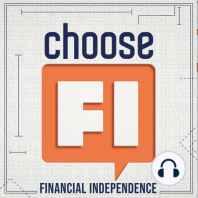22 min listen
273 | What's an Emergency?
FromChooseFI
ratings:
Length:
49 minutes
Released:
Nov 27, 2020
Format:
Podcast episode
Description
We're going back to basics and taking a deep dive into the Roth IRA and the levers, tools, and investing strategies available to investors. Although ChooseFI offers the free FI101 course, taking small actions are important. Get up to speed and start taking action with the free five-day challenge by going to ChooseFI/start. ChooseFI has presented basic investing strategies over the years and will revisit in the coming months to distill and hash out all of the different methods to understand the fundamentals. Many of the strategies have a lot of overlap starting with low-cost broad-based index funds. What they all share is a common-sense approach and simple investing strategy which is that time in the market is better than timing the market. Most traditional index funds are cap-weighted resulting in a higher percentage of money being invested in a few top companies. Rather than take a dogmatic approach to low-cost broad-based fund investing, it may require the application of scrutiny, being open-minded, intellectual honesty, and consideration. JL Collins helped open up Jonathan's eyes to the power of simplicity and helped give him the confidence to start doing better with his finances. But as the terms and concepts have become more familiar, other perspectives become visible, along with the pros and the cons, and the questions he's been able to ask have gotten better. The questions you have as you learn more are worth exploring to help build confidence in your plan. When investing, minimize fees as much as possible. Fees for buying and selling, expense ratios, and advisory fees are all negatively impact your long-term returns. We can learn new things and get rid of limiting beliefs. After a speculative real estate investment went poorly, Brad was afraid of real estate investing. However with some security, knowledge, and looking at it as a business, he has now invested in two single-family rentals which are doing well. Financial independence is not finances. It's not money, health, or time. It's all of it. It's making objective, fair-minded judgments about societal norms, seeking the truth, and making decisions in our best interests. Sean Mullaney is a big proponent of the Roth IRA and the possibility of using a Roth IRA as an emergency fund. Sean says that I all his years of practice, not one of his clients has ever had too much in Roth accounts. The advantage of the Roth IRA is flexibility. With a workplace 401k, your employer does not have to allow distributions and if they do, it is probably subject to penalties and taxes. In contrast, contributions may be withdrawn from a Roth IRA at any time, tax and penalty-free. In a world of uncertainty, you never know when you'll need access to these accounts, whether in an emergency or for early retirement. A Roth IRA can do double duty as an emergency fund and as retirement investing until a separate emergency fund can be established. Sean recommends reading the article on FItaxguy.com explaining Roth IRA Withdrawl and microlayers. Backdoor Roth IRAs are for high-income earners who do not qualify for regular Roth IRAs. Roth IRAs are funded with earned income up to an established limit outside of workplace retirement accounts. Roth IRA limitations for 2021 are a modified adjusted gross income of $198,000-208,000 for married couples and $125,00-140,000 for singles. For an emergency fund, only contributions that may be withdrawn from a Roth IRA. Over the course of contributing for many years, the balance should have grown, but only the contribution amount may be withdrawn tax and penalty-free. Roth IRA earnings may be withdrawn tax and penalty-free only if held in the Roth IRA for five years and you are 59 1/2. Contributions should really only be withdrawn for early retirement or in the event of an extreme emergency, not for minor emergency expenses as the money cannot be put back in. Sean says the same rule applies to health savings accounts. Leave the money in to grow tax and penalty-
Released:
Nov 27, 2020
Format:
Podcast episode
Titles in the series (100)
001 | ChooseFI Podcast: A Finance Podcast for the Middle Class: Introducing a Finance Podcast by FIRE for FIRE In Today’s Podcast we cover: - Welcome to Choose FI’s first podcast from Jonathan Mendonsa and Brad Barrett What the ChooseFI finance podcast is all about: - by ChooseFI
